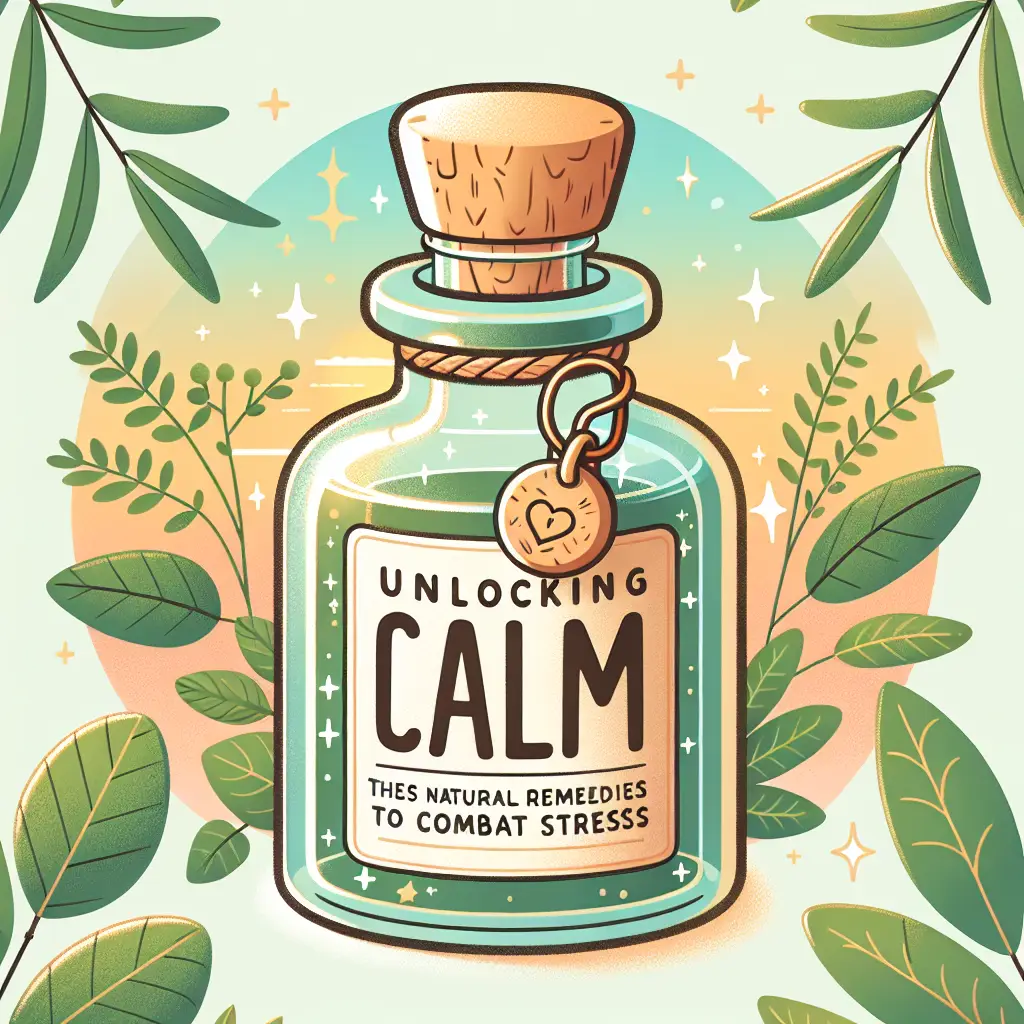
Unlocking Calm: The Ultimate Natural Remedies to Combat Stress
Introduction
In today’s fast-paced world, stress has become an inevitable part of our lives. Whether it’s due to work pressures, family responsibilities, or the incessant flow of information from digital devices, many individuals find themselves overwhelmed. This sense of constant pressure not only affects our mental well-being but can also lead to significant physical health issues if left unchecked. This article will guide you through Unlocking Calm: The Best Natural Remedies to Combat Stress, helping you rediscover serenity in your life.
The truth is that our bodies are finely tuned to react to stress. The challenge comes when our stress response is triggered continuously without sufficient relief. Thus, it’s essential to adopt natural remedies that can effectively counteract this persistent stress cycle. Exploring the best natural strategies not only empowers you to take control of your stress but also opens up avenues for holistic well-being.
Understanding Stress: A Brief Overview
Before we delve into the remedies, let’s briefly examine the biological mechanics behind stress. Stress triggers the release of hormones such as cortisol and adrenaline. While these hormones can be helpful in small doses (think ‘fight or flight’ scenarios), chronic stress leads to detrimental effects, including anxiety, depression, digestive issues, and cardiovascular problems.
The Importance of Managing Stress
To lead a fulfilling life, effective stress management is pivotal. Chronic stress can have a domino effect—taking a toll on productivity, relationships, and overall health. By unlocking calm through natural remedies, one can foster resilience against the daily triggers of stress.
Best Natural Remedies to Combat Stress
1. Herbal Supplements: Nature’s Pharmacy
Herbal remedies have been used for centuries to alleviate stress. Let’s explore some of the most effective options.
1.1 Ashwagandha
Ashwagandha is an adaptogen—a natural substance that helps the body adapt to stress. Research indicates that ashwagandha can significantly reduce cortisol levels and genetic markers of stress. In a study conducted with 64 participants, those who took ashwagandha experienced a 30% reduction in stress levels after 60 days.
1.2 Chamomile
Known for its calming properties, chamomile is another popular herb. A study found that those who took chamomile extract reported a significant decrease in anxiety symptoms compared to those who did not.
2. Mindfulness and Meditation: Cultivating Inner Peace
Embracing mindfulness and meditation can profoundly impact stress levels. These practices help in grounding yourself in the present moment, thus reducing feelings of anxiety.
2.1 Case Study: The Mindfulness Program
A structured mindfulness program implemented at a corporate workplace aimed to reduce employee stress. Over three months, employees engaged in guided meditation sessions twice a week. A survey revealed a 40% increase in reported well-being and a noticeable decrease in symptoms of burnout.
2.2 Tips for Beginners
- Start Small: Begin with just five minutes of daily meditation.
- Use Guided Apps: Consider apps like Headspace or Calm to get started.
3. Essential Oils: Aromatic Allies Against Stress
Unlocking calm can also involve olfactory therapy. Essential oils possess calming properties that can significantly help combat stress.
3.1 Lavender Oil
One of the most popular essential oils, lavender, has been shown to decrease anxiety and improve sleep quality. In a clinical trial, participants who inhaled lavender oil before surgery reported lower anxiety levels.
3.2 How to Use Essential Oils
- Diffusion: Use an essential oil diffuser during meditation or at night for better sleep.
- Topical Application: Mix with a carrier oil and apply to pulse points for an instant calm.
4. Nutrition: Eating Your Way to Calm
Our diet plays a crucial role in how we handle stress. Consuming certain foods can help your body cope more effectively.
4.1 Omega-3 Fatty Acids
Fatty fish, walnuts, and flaxseeds are rich in omega-3s, which have been shown to reduce symptoms of anxiety. A meta-analysis demonstrated that individuals consuming omega-3 supplements reported lower anxiety levels.
4.2 Magnesium-Rich Foods
Magnesium can help regulate neurotransmitters. Foods like spinach, almonds, and avocados are excellent sources. Research reveals that magnesium deficiency is commonly linked to increased anxiety.
| Food | Magnesium Content (mg) |
|---|---|
| Spinach (cooked) | 157 |
| Almonds | 76 |
| Avocado | 58 |
5. Physical Activity: The Stress Buster
Regular physical activity is a proven way to reduce stress levels. Exercise releases endorphins—natural mood lifters.
5.1 Case Study: Yoga and Stress Relief
A group of participants engaged in weekly yoga sessions over six months. Participants reported a 50% decrease in perceived stress levels. Moreover, their mindfulness and emotional resilience improved markedly.
5.2 Quick Exercise Tips
- 10-Minute Walk: Take a brisk walk to clear your mind.
- Online Yoga: Search for online classes that fit your schedule.
6. Sleep: The Cornerstone of Calm
Never underestimate the power of a good night’s sleep. Lack of sleep can exacerbate stress, creating an endless loop of fatigue and anxiety.
6.1 Strategies for Better Sleep
- Consistency is Key: Go to bed and wake up at the same time each day.
- Sleep Environment: Make your bedroom a stress-free zone—dark, cool, and quiet.
7. Connection: The Importance of Social Support
Building strong social connections is vital for emotional health. Engaging with friends and family can act as a buffer against stress.
7.1 Case Study: Community Support Groups
In various studies, individuals who actively participated in community support groups reported improved coping mechanisms and lower levels of perceived stress. Regular gatherings fostered a sense of belonging.
Conclusion
Unlocking calm: The best natural remedies to combat stress is a journey of discovering what works best for you. From herbal supplements and essential oils to mindfulness and physical activity, there’s a wealth of strategies available to help reduce stress. Remember that managing stress is not a one-size-fits-all approach; experimentation and personalization are key.
Ultimately, the most profound change comes from a commitment to your well-being. As you implement these natural remedies, take it one day at a time and observe how they impact your stress levels. By embracing these strategies, you’re not just coping; you’re thriving.
FAQs About Natural Remedies for Stress
1. Are herbal supplements safe to use daily?
Yes, many herbal supplements are safe for daily use, but it’s crucial to consult with a healthcare provider to avoid interactions with medications.
2. How long will it take to notice improvements?
Results can vary, but many individuals experience benefits within a few weeks of regular practice.
3. Can essential oils really make a difference?
Absolutely! Essential oils can activate the olfactory system, promoting relaxation and reducing stress.
4. Is mindfulness meditation difficult to learn?
It may seem challenging initially, but with practice, mindfulness becomes easier and more beneficial over time.
5. How does diet affect stress?
Certain nutrients can help regulate hormones and neurotransmitters, influencing your stress levels. Opting for a balanced diet can enhance your resilience to stress.
Incorporate these insights and strategies into your daily life, and you’ll be well on your way to unlocking calm amidst life’s inevitable stresses.

















